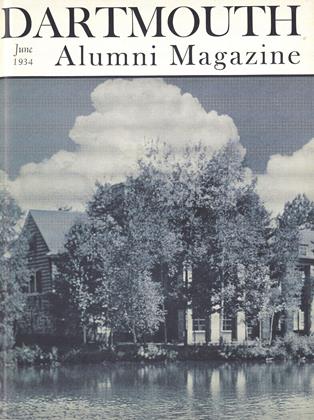SOME YEARS AGO the value of higher education was seldom questioned. Today the whole process, such as is involved in the consideration of the college, is not only questioned but is actually under fire. And most of the criticism, favorable as well as unfavorable, has come directly from within the college itself, from administrative officials, faculty, and students. The student approaching graduation is usually subject to feelings of disappointment. He regrets not only lost time and lost opportunity but he thinks of courses which did not measure up to his expectations, of untaken courses which he might have taken, of majors more or less congenial, of men on the faculty whom he wished to know better, and many other things. He has a feeling of doubt about his own coming adventure in the world of affairs and wonders how well his college training will stand him in stead.
Dartmouth, which has been most vitally concerned during the administration of President Hopkins with presenting a curriculum that would fit the times and retain the traditional values of inherited culture, has become one of the chief champions of the liberal college idea. And after years of trial, experimentation, scrutiny and examination of every educational system in this country and abroad, the College is crystalizing its findings in a specific organization and program. The appointment of a dean of the faculty this year to supervise the entire curriculum, and the ensuing reorganization of departmental work and schedules, are facts that are far in advance of the ideas of those critics who would consign the liberal college to the discard.
The College has had to fight. It has had its enemies both among educators and those not directly concerned with educational institutions. The College has been obliged to state its purpose, to devise a program which would justify its existence, and then to carry on in a manner that would prove its worth.
In the statements of departmental chairmen for courses to be given next year there is a hint of the breadth and the scope which Dartmouth of the future will possess. There seems to be no better way to illustrate this point than to reprint here an announcement of a new course in the department of physics, a course which may be taken by any student who has had a good grounding in physics in a secondary school and has the permission of his instructor:
"Prof. Hull is offering a new course, number 21-22, under the title 'An Elementary Survey of Modern Physics.' The term Modern Physics mustalways be a relative one. At present it generally implies a study of the phenomena which were broughtto light near the close of the last century; phenomena including and resulting from the discovery ofelectric waves, of X-rays, of the electron, of radioactivity, together with the theories which have beenevolved in an attempt to bring all these phenomenainto a common philosophy. The experimental basisfor our view that matter possesses a dual nature—ofparticles and waves, and that light possesses a dualnature—of waves, and particles, will be presented.Atoms, electrons, photons, and the very new unitsof mass and electricity, positrons, neutrons, neutrinos, the building blocks of matter, electricity,radiant energy—these, so far as we can now see, formthe universe and these will be the subject of study.
"The course will be historical, experimental,philosophical, perhaps speculative rather than technical and computational. The experimental viewpoint will be stressed, classical experiments will bereviewed and frequent experimental demonstrations will be given. The mathematical operationswill be of the simplest nature."
 View Full Issue
View Full Issue
More From This Issue
-
 Class Notes
Class NotesClass of 1923
June 1934 By John C. Allen, "Graham Whitelaw" -
 Article
ArticleHANOVER BROWSING
June 1934 By Rees H. Bowen -
 Class Notes
Class NotesClass of 1910
June 1934 By Harold P. Hinman -
 Sports
SportsBaseball
June 1934 By C. E. Widmayer '30 -
 Class Notes
Class NotesClass of 1908
June 1934 By L. W. Griswold -
 Class Notes
Class NotesClass of 1914
June 1934 By Edwrd Leech, Ed Leech
Article
-
 Article
ArticleDARTMOUTH CLUB FORMED AT HOLYOKE, MASS
April, 1922 -
 Article
ArticleDARTMOUTH'S NEW LEADER
October 1945 -
 Article
ArticleThe Coming Month
January 1955 -
 Article
ArticleA Wah Hoo Wah for –
OCTOBER 1963 -
 Article
ArticleBreakfast with the president
NOVEMBER • 1985 -
 Article
ArticleThe Undergraduate Chair
February 1949 By Robert L. Allcott '50.


